29th August 2008 - News report
MOTOR RACING WORLD CHAMPION DIES WITH PARKINSON'S DISEASE
Formula 1 Motor racing World champion, Phil
Hill has died of the complications of Parkinson's Disease. He is the only
American born motor racing driver to have become Formula 1 World Champion.
He competed in Formula 1 from 1958 until 1966. The year he became World
champion he won the Italian Grand Prix and the Belgian Grand
prix,
driving a Ferrari.
 He beat four World champions : Graham Hill, John
Surtees, Jack Brabham, Jim Clark, who between them won the World
championship 8 times. Phil Hill also won the prestigious Le Mans 24 hour
race 3 times.
For more information go to
Phil Hill. His
achievements were detailed in "Phil Hill, Yankee Champion : First American
to win the driving championship of the world"
Click here for more details.
Phil Hill died after a long battle with
Parkinson's Disease at the age of 81.
For more information go to the
Complete article.
For his web site go to
Official web site.
He beat four World champions : Graham Hill, John
Surtees, Jack Brabham, Jim Clark, who between them won the World
championship 8 times. Phil Hill also won the prestigious Le Mans 24 hour
race 3 times.
For more information go to
Phil Hill. His
achievements were detailed in "Phil Hill, Yankee Champion : First American
to win the driving championship of the world"
Click here for more details.
Phil Hill died after a long battle with
Parkinson's Disease at the age of 81.
For more information go to the
Complete article.
For his web site go to
Official web site.
27th August 2008 - News release
AZILECT CLAIMED TO SLOW PROGRESSION OF
PARKINSON'S DISEASE
Azilect (rasagiline) is a MAO inhibitor that
is sometimes used in the treatment of Parkinson's Disease.
For more
information go to
Rasagiline.
Teva Pharmaceutical
Industries have announced results of the phase III ADAGIO trial concerning
Azilect. Teva have claimed that Parkinson's disease patients who took
Azilect (rasagiline) 1mg tablets once-daily upon entry into the trial,
demonstrated a significant improvement compared to those who initiated the
drug 9 months later, implying that it is better to begin the use of
Azilect earlier. Consequently, it has
been widely claimed
that Azilect slows the progression of Parkinson's Disease. However, the
claims are misleading and unsubstantiated.
As the use of Azilect progressed, those patients that had begun Azilect
earlier were no different
than those that had
started Azilect later.
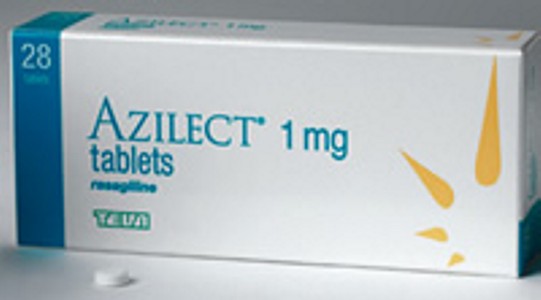 During weeks 48-72, the effect of earlier use of
Azilect was described as being merely "non-inferior" to those that started
Azilect later.
For more information go to the
Complete article.
MAO inhibitors, such
as Azilect do nothing to slow progression of Parkinson's Disease either,
as all drugs end up having an opposite negative effect in the long term
due to a biochemical mechanism called "feedback inhibition". "Feedback
inhibition" is a mechanism via which the body counteracts the artificial
effects of any drug.
During weeks 48-72, the effect of earlier use of
Azilect was described as being merely "non-inferior" to those that started
Azilect later.
For more information go to the
Complete article.
MAO inhibitors, such
as Azilect do nothing to slow progression of Parkinson's Disease either,
as all drugs end up having an opposite negative effect in the long term
due to a biochemical mechanism called "feedback inhibition". "Feedback
inhibition" is a mechanism via which the body counteracts the artificial
effects of any drug.
26th August 2008 - New book
PARKINSON'S DISEASE : PATHOGENIC AND
THERAPEUTIC INSIGHTS
Richard Nass (editor), Serge Przedborski
(editor)
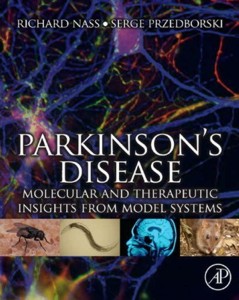 Publisher's
description : Despite its high prevalence in society and many decades of
research, the origin of the pathogenesis and the molecular determinants involved
in the disorder has remained elusive. Confounding this issue is the lack of
experimental models that completely recapitulate the disease state. The
identification of a number of genes thought to play a role in the cell death,
and development of both toxin and genetic models to explore the function of the
genes both in unaffected and diseased cells are now providing new insights into
the molecular basis of the neurodegeneration, as well as therapeutic approaches.
In this book, the advances and the advantages that various invertebrates, cell
culture, rodents, and mammals provide in the identification of the molecular
components and mechanisms involved in the cell death will be described, as well
as the opportunities that these systems provide in drug discovery.
Click here for more details.
Publisher's
description : Despite its high prevalence in society and many decades of
research, the origin of the pathogenesis and the molecular determinants involved
in the disorder has remained elusive. Confounding this issue is the lack of
experimental models that completely recapitulate the disease state. The
identification of a number of genes thought to play a role in the cell death,
and development of both toxin and genetic models to explore the function of the
genes both in unaffected and diseased cells are now providing new insights into
the molecular basis of the neurodegeneration, as well as therapeutic approaches.
In this book, the advances and the advantages that various invertebrates, cell
culture, rodents, and mammals provide in the identification of the molecular
components and mechanisms involved in the cell death will be described, as well
as the opportunities that these systems provide in drug discovery.
Click here for more details.
24th August 2008 - New research
THE MYTH OF
ALPHA-SYNUCLEIN IN PARKINSON'S DISEASE
Biochimica et Biophysica Acta [2008] Aug
5; [Epub ahead of print] (Jelliger KA)
Complete abstract
Alpha-synuclein is an element in the cells whose accumulation and toxic effects
have been claimed to be the cause of Parkinson's Disease.
For more
information go to
Alpha-Synuclein. Alpa-synuclein
has been claimed to occur as a hallmark symptom of Parkinson's Disease.
Consequently a huge amount
of research has been aimed at ceasing the
accumulation of
Alpha-Synuclein and nullifying its negative effects in Parkinson's Disease.
However, new research
has detailed this
assumption to be false.
There are people with Parkinson's Disease
that have no accumulation of
alpha-synuclein,
and people who have accumulated alph-synuclein who do not have Parkinson's
Disease.
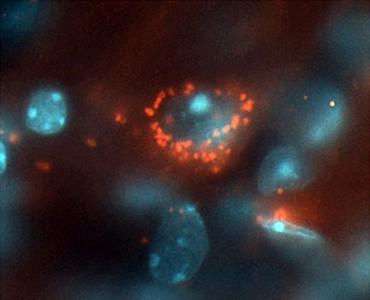 In autopsy
studies, 30% to 55% of elderly subjects
with widespread alpha-synuclein pathology were found to have no definite
neuropsychiatric symptoms or were not classifiable. When alpha-synuclein had
accumulated further, Parkinson's Disease was often found to be less.
Alpha-synuclein can also accumulate in Dementia with Lewy Body Disease,
showing that it can appear in other neurological disorders, whilst
not causing Parkinson's Disease at all. Consequently, much of the research presently being carried out concerning Parkinson's Disease is being
done without having any scientific or factual basis.
In autopsy
studies, 30% to 55% of elderly subjects
with widespread alpha-synuclein pathology were found to have no definite
neuropsychiatric symptoms or were not classifiable. When alpha-synuclein had
accumulated further, Parkinson's Disease was often found to be less.
Alpha-synuclein can also accumulate in Dementia with Lewy Body Disease,
showing that it can appear in other neurological disorders, whilst
not causing Parkinson's Disease at all. Consequently, much of the research presently being carried out concerning Parkinson's Disease is being
done without having any scientific or factual basis.
18th August 2008 - News report
california
funds numerous stem cell projects
California's stem cell agency has awarded
$59 million to support the budgets of 23 researchers to carry out new stem cell
research projects. Human stem cells, particularly those found in embryos, are
primitive cell types that can be made to differentiate into virtually all the
specialized cells and tissues of the body. The California Institute for
Regenerative Medicine was created with a $3 billion bond issue in 2004, which
had been approved by voters. The Institute has so far awarded more than $614
million. They are consequently the world's biggest funders of stem cell
research.
It is claimed that stem cell research may be
invaluable for various medical disorders including Parkinson's Disease.
For more
information go to the
Complete article.
15th August 2008 - New book
TAKE ME HOME : PARKINSON'S, MY FATHER, MYSELF
Jonathan Taylor
 When
Jonathan Taylor was eight, he began to find his father puzzling. The first
thing that happened was that his father couldn't remember Jonathan's
sister's name. Then he began to shake, to drive badly, to forget who or
where he was, and to mistake his son for someone else entirely. "Help help
help," his father would say, on and on, but there seemed to be no helping
him. Doctors diagnosed Parkinson's disease and an associated form of
dementia, and Jonathan gradually became one of his father's carers, taking
it in turn with his family to look after him for the next thirteen years.
Take Me Home is the story of a son's struggle for recognition from a
father who is being transformed mentally and physically by a ruinous
disease, and a writer's struggle to discover a father's strange and
largely secret past - who he was before he became a disappointed
headmaster and, at the last, a trembling Parkinsonian
who sometimes mistook his son for Humphrey Bogart or a giraffe.
Click here for more details.
When
Jonathan Taylor was eight, he began to find his father puzzling. The first
thing that happened was that his father couldn't remember Jonathan's
sister's name. Then he began to shake, to drive badly, to forget who or
where he was, and to mistake his son for someone else entirely. "Help help
help," his father would say, on and on, but there seemed to be no helping
him. Doctors diagnosed Parkinson's disease and an associated form of
dementia, and Jonathan gradually became one of his father's carers, taking
it in turn with his family to look after him for the next thirteen years.
Take Me Home is the story of a son's struggle for recognition from a
father who is being transformed mentally and physically by a ruinous
disease, and a writer's struggle to discover a father's strange and
largely secret past - who he was before he became a disappointed
headmaster and, at the last, a trembling Parkinsonian
who sometimes mistook his son for Humphrey Bogart or a giraffe.
Click here for more details.
13th August 2008 - New research
NSAIDS
increase parkinson's disease
Current Drug Safety [2006] 1 (3) : 223-225 (Etminan M, Suissa S.)
Complete abstract
NSAIDs (Non-steroidal anti-inflammatory drugs) are drugs with analgesic,
antipyretic and, in higher doses, anti-inflammatory effects. They can reduce
pain, fever and inflammation.
For more information and a list of NSAIDs go
to
NSAID.
 Recent studies have found NSAIDs to be protective against the development of
Parkinson's Disease. However, researchers decided to test this hypothesis using
the Saskatchewan drug plan database. Cases were defined as those having received
three prescriptions for a dopamine agonist within a year. Controls were matched
for age, calendar time and index date. Past users of NSAIDs had a slightly
higher risk of developing Parkinson's Disease, increasing their chances by up to
20%. However, the occurrence of Parkinson's Disease was up to 50% higher amongst
those people that were currently using NSAIDs. The researchers have given no
biochemical explanation as to why this might occur.
Recent studies have found NSAIDs to be protective against the development of
Parkinson's Disease. However, researchers decided to test this hypothesis using
the Saskatchewan drug plan database. Cases were defined as those having received
three prescriptions for a dopamine agonist within a year. Controls were matched
for age, calendar time and index date. Past users of NSAIDs had a slightly
higher risk of developing Parkinson's Disease, increasing their chances by up to
20%. However, the occurrence of Parkinson's Disease was up to 50% higher amongst
those people that were currently using NSAIDs. The researchers have given no
biochemical explanation as to why this might occur.
10th August 2008 - New review
carbon
disulfide as a cause of parkinson's disease
 Carbon disulfide, usually in solvents or pesticides, can cause Parkinson's
Disease that is associated with other neurological symptoms. The effects can
persist for years after exposure to the carbon disulfide has ceased.
Carbon disulfide, usually in solvents or pesticides, can cause Parkinson's
Disease that is associated with other neurological symptoms. The effects can
persist for years after exposure to the carbon disulfide has ceased.
Potential sources : pesticides used as fumigants
[1], disulfiram (a drug
used in the treatment of chronic alcoholism)
[2], industrial solvents
[4], solvents used in the
production of viscose rayon and cellophane film [8] [9].
Means of toxicity : This is not established. Carbon disulphide interferes with
pyridoxal 5-phosphate. Pyridoxal 5-phosphate is essential for the formation of
dopamine from L-dopa. So carbon disulphide can cause
Parkinson's Disease symptoms by reducing L-dopa formation.
Symptoms : atypical Parkinsonism (cerebellar signs, hearing loss, sensory
changes, cogwheel rigidity, decreased associated movements, distal sensory
shading, intention tremulousness, resting tremulousness, and nerve conduction
abnormalities)
[1]; Parkinsonism and
frontal lobe-like syndrome associated with
bilateral lesions of the lentiform
nuclei
[2]; balance problems,
impotence, and irritability, without tremor, cogwheel rigidity,
bradykinesia, or changes in facial
expression
[3]; Parkinsonism,
pyramidal signs, mild cognitive decline, and unresponsiveness to levodopa.
Two patients had a predominantly axonal and sensory polyneuropathy of the lower
legs with fasciculations in one of them. Parkinsonian features were progressive,
even after the patients had stopped work
[4]; encephalopathy with
Parkinsonism, pyramidal signs, cerebellar ataxia, and cognitive impairments, as
well as axonal polyneuropathy
[5]; polyneuropathy,
encephalopathy, tremor; Parkinsonian features, Parkinsonian features without
polyneuropathy or cerebellar signs
[6]; Carbon disulfide
toxicity may persist for several years after exposure to carbon disulfide has
ceased
[7].
Further references : [8] Journal of neuropathology
and experimental neurology [1945] 4 : 324 (R.Richter), [9] British journal of
industrial medicine [1954] 11 : 235 (E.C.Vigliani).
8th August 2008 - News research
parkinson's disease
stem cell line created
Cell [2008] (In-Hyun Park, Natasha Arora, Hongguang
Huo, Nimet Maherali, Tim Ahfeldt, Akiko Shimamura, M.William Lensch, Chad Cowan,
Konrad Hochedlinger, George Q.Daley)
Complete study
A new collection of
disease-specific stem cell lines have been produced, all of which were developed
using the new induced pluripotent stem cell (iPS) technique. The new cell lines
were developed from the cells of patients suffering from a range of conditions
from Down Syndrome to Parkinson's disease. The cell lines the researchers
produced carry
the
genes or genetic components for 10 different diseases, including Parkinson's
Disease. They wanted to
produce
a large number of disease models for stem cell research community to accelerate
research.
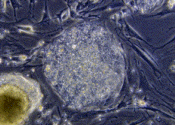 They believe that these cells are invaluable tools that will allow
researchers to watch the development diseases outside of the patients, and that
this will make it possible to find new treatments, and eventually drugs, to slow
or even stop the course of a number of diseases, including Parkinson's Disease.
"The cell lines available from the iPS Core will allow stem cell researchers
around the world to explore possible gene therapies for some conditions, and
will aid in the development of drugs for others," Daley said.
They believe that these cells are invaluable tools that will allow
researchers to watch the development diseases outside of the patients, and that
this will make it possible to find new treatments, and eventually drugs, to slow
or even stop the course of a number of diseases, including Parkinson's Disease.
"The cell lines available from the iPS Core will allow stem cell researchers
around the world to explore possible gene therapies for some conditions, and
will aid in the development of drugs for others," Daley said.
The biochemistry of the dopaminergic neurons (the cells involved in Parkinson's
Disease) is already well known. Therefore, there is limited potential benefit
from further examination of these cells. Most medical researchers are not aware
of what is already known of the biochemistry of Parkinson's Disease.
Consequently, the vast majority of research being carried out in Parkinson's
Disease is fundamentally
flawed because of false assumptions concerning even the basic biochemistry.
4th August 2008 - News report
a ten year old
with parkinson's disease
At the age of ten, Andrew
Carnegie who is now 12 years old, started developing Parkinson's Disease
symptoms. He suffered from stiffness and cramps in the muscles. He lost his
balance easily, and fell frequently. Numerous attempts at obtaining a diagnosis
failed. He was not readily diagnosed with Parkinson's Disease because he was so
much younger than the false and stereotypical view of Parkinson's Disease only
occurring in old people. After he was eventually diagnosed, regular Sinemet
readily rid his symptoms.
For more information go to the
Complete article.
 There
have previously
been children even younger than 10 years old who have had Parkinson's
Disease. The youngest known case of Parkinson's Disease was described in 1875 by
Henri Huchard who had a patient that had all of the symptoms of
Parkinson's Disease who was only three years old. A ten year old American girl
experienced her first symptom at only two
years old. It is uncommon for people under the age of thirty to develop
Parkinson's Disease, which usually occurs when people are significantly older.
However, Parkinson's Disease does not become progressively more likely with age,
because amongst the very oldest of people (those between 110 and 119 years old)
Parkinson's Disease is hardly known.
There
have previously
been children even younger than 10 years old who have had Parkinson's
Disease. The youngest known case of Parkinson's Disease was described in 1875 by
Henri Huchard who had a patient that had all of the symptoms of
Parkinson's Disease who was only three years old. A ten year old American girl
experienced her first symptom at only two
years old. It is uncommon for people under the age of thirty to develop
Parkinson's Disease, which usually occurs when people are significantly older.
However, Parkinson's Disease does not become progressively more likely with age,
because amongst the very oldest of people (those between 110 and 119 years old)
Parkinson's Disease is hardly known.
3rd August 2008 - New forum
the irish parkinson's disease
forum
 The
Irish Parkinson's Disease Forum has been set up for Irish people with an
interest in Parkinson's Disease to
discuss Parkinson's Disease, and the issues and events in Ireland concerning it.
This includes the work and activities of the two Irish Parkinson's Disease
organisations : The Parkinson's Association of Ireland, and PALS support group,
which is primarily for younger people. The Irish Parkinson's Disease Forum is at
present the only Parkinson's Disease Forum for Irish people. The forum is independent and open to anyone to become a member. For their web site,
double click on
The Irish Parkinson's Disease Forum
The
Irish Parkinson's Disease Forum has been set up for Irish people with an
interest in Parkinson's Disease to
discuss Parkinson's Disease, and the issues and events in Ireland concerning it.
This includes the work and activities of the two Irish Parkinson's Disease
organisations : The Parkinson's Association of Ireland, and PALS support group,
which is primarily for younger people. The Irish Parkinson's Disease Forum is at
present the only Parkinson's Disease Forum for Irish people. The forum is independent and open to anyone to become a member. For their web site,
double click on
The Irish Parkinson's Disease Forum
2nd August 2008 - New research
an
autoimmune hypothesis of parkinson's disease
Cell Transplantation [2008] 17
(4) : 363-372 (Monahan AJ, Warren M, Carvey PM.)
Complete abstract
Studies have
demonstrated that a number of substances readily cause toxic damage to the cells
that produce dopamine. However, neuroprotective strategies aimed at dealing with
this toxicity have been largely ineffective in treating Parkinson's Disease. The
researchers suggest that this may be because the progression of Parkinson's
Disease is a consequence of an additional mechanism. Whilst they considered
this, they discovered that animals whose dopamine producing cells were
exposed to the neurotoxins exhibited blood-brain barrier (BBB)
dysfunction.
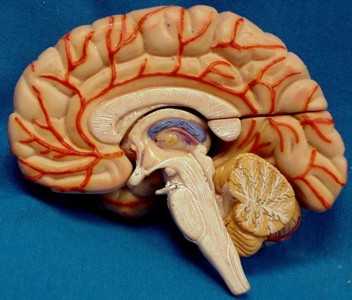 The
blood brain barrier is what usually protects the brain from a number of
damaging substances. If the blood-brain barrier (BBB) in people with Parkinson's
Disease is disrupted, immune cells could enter brain and produce a
self-perpetuating (progressive) degenerative process. In this review, the
authors propose that peripheral immunity contributes to the degenerative process
of Parkinson's Disease and may be responsible for the progressive nature of the
disease. In order to understand this hypothesis, the authors claim that the
reader must question the assumption that the blood-brain barrier
is intact in Parkinson's Disease.
The
blood brain barrier is what usually protects the brain from a number of
damaging substances. If the blood-brain barrier (BBB) in people with Parkinson's
Disease is disrupted, immune cells could enter brain and produce a
self-perpetuating (progressive) degenerative process. In this review, the
authors propose that peripheral immunity contributes to the degenerative process
of Parkinson's Disease and may be responsible for the progressive nature of the
disease. In order to understand this hypothesis, the authors claim that the
reader must question the assumption that the blood-brain barrier
is intact in Parkinson's Disease.
In support of their
theory, the leading researcher concerning the blood brain barrier in Parkinson's
Disease claimed several years ago that the blood brain barrier was dysfunctional
in Parkinson's Disease
[1]
[2]. However, these
studies were not age controlled, which is a considerable failing, because people
with Parkinson's Disease tend to be older. His subsequent studies effectively
nullified the basis for the blood brain barrier theory being dysfunctional in
Parkinson's Disease. He first found that the blood brain barrier tended towards
being dysfunctional in older people anyway, regardless of whether or not they
had Parkinson's Disease
[3]. He also found that
when people developed Parkinson's Disease they did not have a dysfunctional
blood brain barrier
[4]. The blood brain
barrier being no more dysfunctional in Parkinson's Disease than in anyone else
of a similar age leaves the autoimmune theory of Parkinson's Disease without the
basis it requires.
.gif)
.gif)
 He beat four World champions : Graham Hill, John
Surtees, Jack Brabham, Jim Clark, who between them won the World
championship 8 times. Phil Hill also won the prestigious Le Mans 24 hour
race 3 times.
For more information go to
He beat four World champions : Graham Hill, John
Surtees, Jack Brabham, Jim Clark, who between them won the World
championship 8 times. Phil Hill also won the prestigious Le Mans 24 hour
race 3 times.
For more information go to
 During weeks 48-72, the effect of earlier use of
Azilect was described as being merely "non-inferior" to those that started
Azilect later.
For more information go to the
During weeks 48-72, the effect of earlier use of
Azilect was described as being merely "non-inferior" to those that started
Azilect later.
For more information go to the
 Publisher's
description : Despite its high prevalence in society and many decades of
research, the origin of the pathogenesis and the molecular determinants involved
in the disorder has remained elusive. Confounding this issue is the lack of
experimental models that completely recapitulate the disease state. The
identification of a number of genes thought to play a role in the cell death,
and development of both toxin and genetic models to explore the function of the
genes both in unaffected and diseased cells are now providing new insights into
the molecular basis of the neurodegeneration, as well as therapeutic approaches.
In this book, the advances and the advantages that various invertebrates, cell
culture, rodents, and mammals provide in the identification of the molecular
components and mechanisms involved in the cell death will be described, as well
as the opportunities that these systems provide in drug discovery.
Publisher's
description : Despite its high prevalence in society and many decades of
research, the origin of the pathogenesis and the molecular determinants involved
in the disorder has remained elusive. Confounding this issue is the lack of
experimental models that completely recapitulate the disease state. The
identification of a number of genes thought to play a role in the cell death,
and development of both toxin and genetic models to explore the function of the
genes both in unaffected and diseased cells are now providing new insights into
the molecular basis of the neurodegeneration, as well as therapeutic approaches.
In this book, the advances and the advantages that various invertebrates, cell
culture, rodents, and mammals provide in the identification of the molecular
components and mechanisms involved in the cell death will be described, as well
as the opportunities that these systems provide in drug discovery.
 In autopsy
studies, 30% to 55% of elderly subjects
with widespread alpha-synuclein pathology were found to have no definite
neuropsychiatric symptoms or were not classifiable. When alpha-synuclein had
accumulated further, Parkinson's Disease was often found to be less.
Alpha-synuclein can also accumulate in Dementia with Lewy Body Disease,
showing that it can appear in other neurological disorders, whilst
not causing Parkinson's Disease at all. Consequently, much of the research presently being carried out concerning Parkinson's Disease is being
done without having any scientific or factual basis.
In autopsy
studies, 30% to 55% of elderly subjects
with widespread alpha-synuclein pathology were found to have no definite
neuropsychiatric symptoms or were not classifiable. When alpha-synuclein had
accumulated further, Parkinson's Disease was often found to be less.
Alpha-synuclein can also accumulate in Dementia with Lewy Body Disease,
showing that it can appear in other neurological disorders, whilst
not causing Parkinson's Disease at all. Consequently, much of the research presently being carried out concerning Parkinson's Disease is being
done without having any scientific or factual basis. Although Parkinson's Disease is often claimed to be one of the major
concerns of stem cell
research, virtually none of the projects actually deal specifically with
Parkinson's Disease, as can be seen by the list of
Although Parkinson's Disease is often claimed to be one of the major
concerns of stem cell
research, virtually none of the projects actually deal specifically with
Parkinson's Disease, as can be seen by the list of
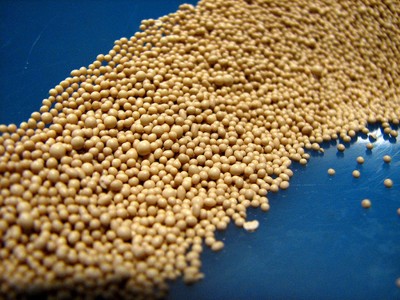 It has been debated as to whether this is to protect the
cells from damage, or
causes
cell damage. Researchers used Hsp104, which is found in yeast, to reduce the
formation of alpha-synuclein, and to prevent cell damage caused by
alpha-synuclein. Hsp140 works with Hsp70 and Hsp40, which are also found in
yeast. It is claimed that Hsp140 protects the cells against the effects of
alpha-synuclein by preventing the accumulation of alpha-synuclein. Researchers
consequently claim that Hsp140 could be used therapeutically in Parkinson's
Disease to prevent the cell damage that often accompanies Parkinson's Disease.
It has been debated as to whether this is to protect the
cells from damage, or
causes
cell damage. Researchers used Hsp104, which is found in yeast, to reduce the
formation of alpha-synuclein, and to prevent cell damage caused by
alpha-synuclein. Hsp140 works with Hsp70 and Hsp40, which are also found in
yeast. It is claimed that Hsp140 protects the cells against the effects of
alpha-synuclein by preventing the accumulation of alpha-synuclein. Researchers
consequently claim that Hsp140 could be used therapeutically in Parkinson's
Disease to prevent the cell damage that often accompanies Parkinson's Disease.
 When
Jonathan Taylor was eight, he began to find his father puzzling. The first
thing that happened was that his father couldn't remember Jonathan's
sister's name. Then he began to shake, to drive badly, to forget who or
where he was, and to mistake his son for someone else entirely. "Help help
help," his father would say, on and on, but there seemed to be no helping
him. Doctors diagnosed Parkinson's disease and an associated form of
dementia, and Jonathan gradually became one of his father's carers, taking
it in turn with his family to look after him for the next thirteen years.
Take Me Home is the story of a son's struggle for recognition from a
father who is being transformed mentally and physically by a ruinous
disease, and a writer's struggle to discover a father's strange and
largely secret past - who he was before he became a disappointed
headmaster and, at the last, a trembling Parkinsonian
who sometimes mistook his son for Humphrey Bogart or a giraffe.
When
Jonathan Taylor was eight, he began to find his father puzzling. The first
thing that happened was that his father couldn't remember Jonathan's
sister's name. Then he began to shake, to drive badly, to forget who or
where he was, and to mistake his son for someone else entirely. "Help help
help," his father would say, on and on, but there seemed to be no helping
him. Doctors diagnosed Parkinson's disease and an associated form of
dementia, and Jonathan gradually became one of his father's carers, taking
it in turn with his family to look after him for the next thirteen years.
Take Me Home is the story of a son's struggle for recognition from a
father who is being transformed mentally and physically by a ruinous
disease, and a writer's struggle to discover a father's strange and
largely secret past - who he was before he became a disappointed
headmaster and, at the last, a trembling Parkinsonian
who sometimes mistook his son for Humphrey Bogart or a giraffe.
 Recent studies have found NSAIDs to be protective against the development of
Parkinson's Disease. However, researchers decided to test this hypothesis using
the Saskatchewan drug plan database. Cases were defined as those having received
three prescriptions for a dopamine agonist within a year. Controls were matched
for age, calendar time and index date. Past users of NSAIDs had a slightly
higher risk of developing Parkinson's Disease, increasing their chances by up to
20%. However, the occurrence of Parkinson's Disease was up to 50% higher amongst
those people that were currently using NSAIDs. The researchers have given no
biochemical explanation as to why this might occur.
Recent studies have found NSAIDs to be protective against the development of
Parkinson's Disease. However, researchers decided to test this hypothesis using
the Saskatchewan drug plan database. Cases were defined as those having received
three prescriptions for a dopamine agonist within a year. Controls were matched
for age, calendar time and index date. Past users of NSAIDs had a slightly
higher risk of developing Parkinson's Disease, increasing their chances by up to
20%. However, the occurrence of Parkinson's Disease was up to 50% higher amongst
those people that were currently using NSAIDs. The researchers have given no
biochemical explanation as to why this might occur.  Carbon disulfide, usually in solvents or pesticides, can cause Parkinson's
Disease that is associated with other neurological symptoms. The effects can
persist for years after exposure to the carbon disulfide has ceased.
Carbon disulfide, usually in solvents or pesticides, can cause Parkinson's
Disease that is associated with other neurological symptoms. The effects can
persist for years after exposure to the carbon disulfide has ceased.  They believe that these cells are invaluable tools that will allow
researchers to watch the development diseases outside of the patients, and that
this will make it possible to find new treatments, and eventually drugs, to slow
or even stop the course of a number of diseases, including Parkinson's Disease.
"The cell lines available from the iPS Core will allow stem cell researchers
around the world to explore possible gene therapies for some conditions, and
will aid in the development of drugs for others," Daley said.
They believe that these cells are invaluable tools that will allow
researchers to watch the development diseases outside of the patients, and that
this will make it possible to find new treatments, and eventually drugs, to slow
or even stop the course of a number of diseases, including Parkinson's Disease.
"The cell lines available from the iPS Core will allow stem cell researchers
around the world to explore possible gene therapies for some conditions, and
will aid in the development of drugs for others," Daley said. There
have previously
been children even younger than 10 years old who have had Parkinson's
Disease. The youngest known case of Parkinson's Disease was described in 1875 by
Henri Huchard who had a patient that had all of the symptoms of
Parkinson's Disease who was only three years old. A ten year old American girl
experienced her first symptom at only two
years old. It is uncommon for people under the age of thirty to develop
Parkinson's Disease, which usually occurs when people are significantly older.
However, Parkinson's Disease does not become progressively more likely with age,
because amongst the very oldest of people (those between 110 and 119 years old)
Parkinson's Disease is hardly known.
There
have previously
been children even younger than 10 years old who have had Parkinson's
Disease. The youngest known case of Parkinson's Disease was described in 1875 by
Henri Huchard who had a patient that had all of the symptoms of
Parkinson's Disease who was only three years old. A ten year old American girl
experienced her first symptom at only two
years old. It is uncommon for people under the age of thirty to develop
Parkinson's Disease, which usually occurs when people are significantly older.
However, Parkinson's Disease does not become progressively more likely with age,
because amongst the very oldest of people (those between 110 and 119 years old)
Parkinson's Disease is hardly known. The
Irish Parkinson's Disease Forum has been set up for Irish people with an
interest in Parkinson's Disease to
discuss Parkinson's Disease, and the issues and events in Ireland concerning it.
This includes the work and activities of the two Irish Parkinson's Disease
organisations : The Parkinson's Association of Ireland, and PALS support group,
which is primarily for younger people. The Irish Parkinson's Disease Forum is at
present the only Parkinson's Disease Forum for Irish people. The forum is independent and open to anyone to become a member. For their web site,
double click on
The
Irish Parkinson's Disease Forum has been set up for Irish people with an
interest in Parkinson's Disease to
discuss Parkinson's Disease, and the issues and events in Ireland concerning it.
This includes the work and activities of the two Irish Parkinson's Disease
organisations : The Parkinson's Association of Ireland, and PALS support group,
which is primarily for younger people. The Irish Parkinson's Disease Forum is at
present the only Parkinson's Disease Forum for Irish people. The forum is independent and open to anyone to become a member. For their web site,
double click on
 The
The